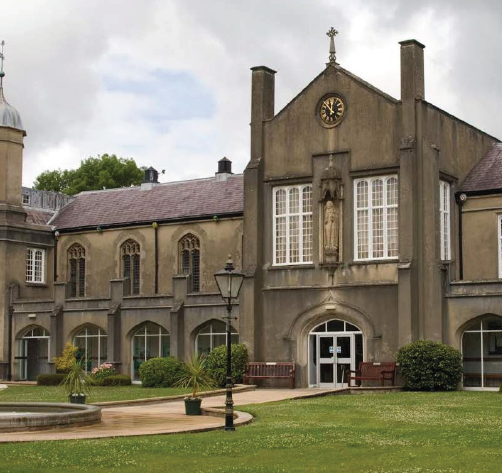Education
Plaid Cymru aiming higher for education


University: ‘Not the be all and end all’
“WHAT the Welsh Government needs to do,” said Simon Thomas, “is stop complaining about what those nasty Conservatives are doing and start setting out proposals of its own on Welsh education.”
The Plaid Education spokesperson and candidate for Carmarthen West and South Pembrokeshire was very clear on that point when he spoke with The Herald.
“Labour always seems to want to set up a Labour/Conservative fight. I would prefer to concentrate on formulating a Welsh policy, saying this is what we want to do; then, if the UK Treasury doesn’t play fair, we can point out what opportunities have been lost because of it. By just complaining, the current Welsh Government is simply not offering an alternative, positive vision.”
And being positive was very important to Simon Thomas.
“We have just launched our policy from Cradle to Career. That sets out a plan from 3-16 and in the post-16 framework gives a clearer balance between tuition fee policy and apprenticeships.”
Of that policy, Leanne Wood, Plaid’s leader has said: “We are investing in the very early years but also making sure people have a range of choices when they get to fourteen, fifteen and sixteen so that the academic route is not the only option but that there are serious vocational options as well.”
That point is clearly close to Simon Thomas’s own heart: “Last month we announced our plans to create 50,000 additional apprenticeships in Wales. Those would be new apprenticeships. Today, Labour has announced 100,000 apprenticeships in total. There are already 44,000 Welsh apprenticeships, so the level of apprenticeships being offered is in the same direction as our policy. We have made a commitment to show what we would do with the UK Government’s Apprenticeship Levy.
“It was a budget deal we made with Labour which stopped the fall in the numbers of Welsh apprenticeships. So I am, and Plaid is, committed to providing more apprenticeships and – importantly – more higher apprenticeships at Level 4 and beyond. By investing in higher skills there is a huge potential for Wales.”
And as for the narrower party point, Simon Thomas did not mince his words: “A clearer framework is vital. There are a lot of missing pieces in Labour’s plans and they have made no announcement on tuition fees at all.”
He continued: “The Welsh Government has kicked the question of tuition fees into the long grass. That is dishonest. After the election there will be a new Education Minister, Huw Lewis is retiring, and it will be up to them to make a decision the Welsh Government knows has to be made on tuition fees for higher education.”
The Welsh Government commissioned a report into higher education funding in Wales and we asked Simon Thomas about what it reported: “The report (by Professor Sir Ian Diamond) could not be clearer. All of those bodies which responded to it agreed that the current tuition fee policy is completely unsustainable.
“The evidence is overwhelming and unanswerable, but the Welsh Government has decided to wait until October and then probably feign surprise when it is told things have to change. As I say, the Welsh Government’s position on tuition fees is dishonest.
“It was Labour that introduced tuition fees. I fought it every step of the way in Parliament to stop it applying to Wales.
But what of Plaid’s policy?
“We’ve kept some flexibility in our plans, because we don’t know what will be the recommendation about the maintenance element of student support. But we have made it clear that continuing to send £100m of the Welsh block grant to English universities is a non-starter. You could argue that it would be tolerable in times of plenty, but these are times of austerity.
“We need to remember that of the tuition fee loan, the student sees not one penny. The students are funding the universities who are charging the maximum possible. 45% of students do not even reach the level of income where they need to repay the loans made to them.”
We asked where that left Plaid’s policy on tuition fee abatement, the ‘Learning Bonds’ it announced recently: “For a Welsh student studying in England, if they return to Wales within five years of graduation we will offset their tuition fee loan repayments for each full year. We want everyone to be able to study any subject and in any university they want to. But the current tuition fee policy means we give more money to universities outside of Wales than we do inside of Wales. This is unsustainable and Plaid Cymru believes that this is wrong. Our plans will enable students from Wales to study anywhere they want, and will ensure that the Welsh economy can benefit from the talent of Welsh students.
“Under Plaid Cymru’s plans, students from Wales who study a three-year degree will have £18,000 of their loans written off.”
Simon continued: “Our plan acknowledges wages in Wales are generally lower; it means that if you are, for example in London in a wellpaid job, a positive incentive exists for you to take your skills back to Wales.”
He smiled: “Significantly, I think, there’s been no attack on our policy from Labour: I think they are probably looking at something similar.”
Regarding postgraduate funding, Simon Thomas returned to his core grievance about the existing Welsh Government’s approach: “This is an example of where Labour is simply complaining instead of putting forward a positive alternative itself. The Welsh Government should be saying this is what we are going to do and challenging Osborne to allow Welsh students access to the loans system English students will have.
“It’s the usual thing: the Treasury has not considered the Welsh aspect: it is not devolution-aware when it comes to this sort of policy. But the lack of challenge from the Welsh Government, the lack of an alternative policy: that is letting Wales down.”
He continued: “We want to see similar scheme as in England, where from September people studying for postgraduate degrees will have access to loan funding for their studies. What this means is that English students will have tuition fee support for studying in Wales, whereas Welsh students are not eligible for any support to study anywhere.
“Our tuition fee policy will release money back to Hefcw to support part time study, Coleg Cymraeg and postgraduate study for Welsh students. The problem now is that, if we are in government after May it will already be too late to do something this year. There’s simply no headroom in the budget.”
On the deep cuts to the further education sector, Simon Thomas was cautious: “I don’t want to make a firm commitment before seeing the books, I have talked already about £100m being released back through changing the tuition fee policy. £70m of that was taken from HEFCW’s budget, the rest was robbed out of the Further Education budget. So, our higher education policy will release significant money back to FE and enable us to strike a fairer balance.
“A University education is not the be all and end all of education. We have to realise that. Young people need to have more and better choices: at the moment they are all being pointed in one direction – towards Higher Education. We are committed to looking from starting from the position that there is more than one option and that it is possible for young people to develop graduate level skills through further education and higher skills apprenticeships. The benefit for those young people is that they will not have student debt and will have the sort of higher skills that will be an advantage to them and an advantage for Wales.”
Simon reflected: “The problem is around tuition fees. If you want to pack the maximum number of people in for 9K a year, then the cheapest way is humanities but not at a high level. Not with the rigour associated with it. We’re in danger, and unis have said this, of a race to the bottom to feed the machine because everyone comes with 9K a year on their head.
“We have to change that. We have to provide a better infrastructure for young people, not simply churn them through a factory to produce graduates without the skills the economy needs.”
On Welsh Medium Education, Simon Thomas acknowledged: “There is a weakness in College education in Welsh. In sixth forms, there is some provision but that is centred about academic subjects, not things like Gofal Plant and other vocational skills.”
What about locally: “What Pembrokeshire County Council is clearly seeking to do is to scrap sixth forms through a partnership with Pembrokeshire College and then place the onus for post-16 Welsh Medium Education on Ysgol Preseli. I do not see how that can deliver vocational post-16 training in Welsh. There is an extent to which I share the view of Cymdeithas yr Iaith, that post-16 there is an issue about continuing Welsh Medium education post-16.”
He continued: “The important thing about the legislation about reorganisation is that decisions are made locally and not nationally. Local decision-making must come first. I can see people fighting for their schools’ sixth forms, but education has changed enormously. In rural areas, it is sometimes not going to be possible to retain sixth forms that can provide the range of courses needed.”
A wintry smile: “That said, when we’re out and about knocking on doors, Pembrokeshire County Council comes up and has a poor reputation on the doorstep.”
We concluded by asking Simon Thomas about a recent remark made by Carmarthenshire Councillor Meryl Gravell. Ms Gravell opined at a recent Executive Board meeting that the standard of teachers coming out of Wales’s training centres was substandard.
“Let’s put it this way, I don’t think she worded it correctly, or described the problem correctly. The issue is one of the training we give our teachers. It’s not the quality of the individuals, we are not delivering them with the skills they need. There has been a number of failed reorganisations. The problem has been that changes have aimed to provide a little bit for everyone.”
Simon Thomas was generous to Huw Lewis, the outgoing Education Minister: “I believe he is sincere in wanting to put things right with the way teacher training is delivered. We have to focus on preparing teachers for their careers and retaining them. Huw Lewis seems genuinely committed to raising the bar on teacher training.”
And Plaid’s policy: “As part of our Cradle to Career policy, we want teachers in Wales to get to the level of Masters in Education; providing CPD for two years and then a premium for teachers to reach higher standard.
“Teaching is the most important factor in raising schools standards and raising pupils’ attainment. That’s why Plaid Cymru wants to invest in our teachers, helping them remain on the cutting edge of best practice in order to drive up standards and raise attainment levels.
“We will offer teachers and teaching assistants a premium of up to 10% on their pay in return for developing additional skills. Plaid Cymru will reward upskilling and best practice, and will work with the sector to develop a system of accreditation, aiming for 25% of teachers to gain this premium.”
Simon Thomas concluded: “Education is the bedrock of a strong economy, and our plans are aimed at raising children’s attainment and delivering tangible economic benefits.”
Education
Research reveals nearly half of children in Wales had additional learning needs

A NEW study has highlighted the prevalence of additional learning needs, formerly known as special educational needs, among under 16-year-olds in Wales. The findings come with a policy briefing, calling for a robust review of processes used to recognise such issues and more inclusive learning support for all children nationally.
The research and policy reports, led by the University of Bristol and funded by the Nuffield Foundation, found nearly half (47.9%) of children born in 2002/2003 were identified with some form of additional learning needs (ALN) at some point during their schooling. This was shown to have the biggest impact on academic achievement across all Key Stages of their education.
Lead author Dr Cathryn Knight, Senior Lecturer in Psychology of Education at the University of Bristol, said: “Our findings clearly challenge the notion that learning needs only affect a minority of learners. Key common factors increasing the likelihood of being identified with SEN also emerged, emphasising the importance of recognising the child’s environment and understanding their individual situation to effectively support their learning needs.”
Researchers from the University’s School of Education and Swansea University analysed data from more than 200,000 children in Wales, born between 2002 and 2009, to understand the levels of SEN and its impact on academic achievement.
Findings revealed that the earlier the additional needs emerged and were recognised, and the longer their education was spent with these known needs, the less likely they were to meet nationally expected levels of attainment.
Dr Knight said: “Our research suggests the former SEN system in Wales was unable to effectively support students to mitigate the negative impact of SEN on their grades. This underscores the substantial toll of SEN on academic achievement. To improve academic attainment levels in Wales, it is crucial to prioritise effective support for this very large group of learners.”
Learners having free school meals (FSM) throughout their education were found to be four times more likely to be identified with SEN compared to those not in receipt of free meals. Those born in the most deprived neighbourhoods were shown to be even more likely (4.6 times) to be identified with SEN.
The study also showed boys were much (5.5 times) more likely to be identified with SEN than girls. Children with higher school attendance had a lower likelihood of SEN identification and learners born in the summer, so younger in their year group, were three times more likely to be identified with SEN than those born in the autumn.
Dr Knight said: “This raises concerns about the effectiveness of SEN identification processes, particularly given the unexpectedly high number of learners identified with SEN. It suggests a potential issue of over- or under-identification of certain children.”
The main policy recommendations in the report were to prioritise inclusive educational initiatives that recognise and support all children. The substantial impact of SEN on children’s grades, raises questions about how children with learning needs can be supported to show progression within the education system. Therefore, consideration of more inclusive assessment practices is recommended. The report also calls for current methods used to identify learning need to be rigorously reviewed, with a new focus on ensuring accuracy, fairness, and inclusivity.
The research mirrors similar national findings. Evidence from the Education Policy Institute in England also found a high level (40.7%) of SEND (Special Educational Needs and Disability) identification. Other research, published in the British Educational Research Journal, has also shown that children with SEND in England are also far less likely to meet expected learning standards than their peers at Key Stage 1.
Dr Knight said: “We also need longer-term evidence within Wales and across the UK in order to develop a fuller understanding of the challenges. This includes possible systematic issues with how learning needs are recognised and their subsequent impact on attainment.”
Education
School children focus on Pembrokeshire’s renewable energy future

FENTON COMMUNITY PRIMARY SCHOOL welcomed renewable energy experts to help Year 5 and 6 learners broaden their knowledge as part of their Marine Energy Project.
During the summer term Blue Gem Wind, Pembrokeshire Coastal Forum and the Darwin Experience have discussed Pembrokeshire’s importance in the renewable energy sector and low carbon technologies with the school children.
Learners designed and built models of different anchorage structures for offshore turbines, and learnt from the Darwin Centre about the different marine organisms that might colonise them.

They pitched their design ideas, with a combination of class designs being built and deployed at the Marine Energy Test Area (META) in Milford Haven by Pembrokeshire Coastal Forum.
The visits have inspired many new ideas and possibilities for the future of the learners.
Summer Marshall (Year 6) explained: “It was a great opportunity for our designs to be actually made into something for a real-life purpose.”
“If it wasn’t for this project I wouldn’t have learned about the importance of marine habitats and how these are linked to our future,” added TJ Hill (Year 6)
“It is really important because a lot of future jobs will be based around renewable energy and technology,” said Milly Badger (Year 6).
“From having Blue Gem Wind, META and Darwin visit, it’s made me think about a job in renewable energy,” added Oscar Davies (Year 6).
Acting Executive Headteacher Gareth Thomas said: “The project has enabled development of careers and work-related experiences with our learners. Direct industry engagement has been crucial to motivate our learners to think about the future jobs in Pembrokeshire and the life they may lead here.”
Year 5 and 6 teachers Leah Hackett, Matthew Vaughan and Mike Lowde agreed that many of their pupils could work in the renewable industry in future.
“Hopefully, after this, we have a group of enthusiastic pupils who already have a keen understanding of the benefits of renewable energy and the place it holds in Pembrokeshire and the wider world,” they added.
Education
Pupils delight in ice cream treat from Pembrokeshire’s number one van

CHILDREN at Ysgol Caer Elen in Haverfordwest were treated to a delightful surprise on Tuesday when they were all given the opportunity to enjoy ice cream, generously provided by Mr McGeown and his family.
The delicious ice cream, a highlight of the school’s summer celebrations, was not just a treat for the pupils but also a testament to the McGeown family’s commitment to supporting educational projects. The funds raised by the family have been donated to the school, aimed at enhancing various school initiatives.
The joyous event was made even more special by the efforts of volunteers Martin, Sian, Amirah, Jack, and Alyannah, who served the ice cream. Their contribution ensured that the occasion was filled with a wonderful and happy atmosphere.












The school extends its heartfelt thanks to Mr McGeown and his family for their generosity and support. Their donation will play a crucial role in the continued development and success of school projects, benefiting all pupils.
“We are incredibly grateful to Mr McGeown and his family for their kindness and support,” said Mr Dafydd Hughes, the headteacher of Ysgol Caer Elen. “The ice cream treat brought immense joy to the children and added to the spirit of our summer celebrations.”
Ysgol Caer Elen, a pioneering Welsh-medium school catering to students from ages 3 to 16, prides itself on its vibrant community and commitment to high-quality education in Pembrokeshire. The school’s ethos centres on creating a caring and inclusive environment where every pupil is encouraged to achieve their best and develop their skills for the 21st century
The community looks forward to seeing the positive impact of the McGeown family’s contribution, as the school continues to thrive with the support of dedicated and caring individuals.
-

 Education5 days ago
Education5 days agoMilford Tesco worker achieves Oxford dream and lands top legal job
-

 Crime4 days ago
Crime4 days agoHaverfordwest man admits having nearly 1000 child and animal images
-

 Crime4 days ago
Crime4 days agoYouth set to appear in court over serious sexual offences
-

 Crime4 days ago
Crime4 days agoPolice investigating after man injured during altercation in cemetery
-

 Education4 days ago
Education4 days agoPupils delight in ice cream treat from Pembrokeshire’s number one van
-

 Crime4 days ago
Crime4 days agoTown centre ‘stinking of skunk’ as police strip cannabis farm
-

 Crime3 days ago
Crime3 days agoFag-butt police court summonses spark debate in Pembrokeshire
-

 News6 days ago
News6 days agoProposal to give firefighters a council tax discount to go to Cabinet





























